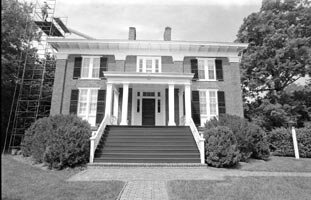Big deed: Downtown house sets price record
Robert Vickery lives just a few doors down from the house he sold in 1996 for $395,000. But he might as well be living in Heartbreak Hotel.
On August 17, that same house, now assessed for $730,400, sold for $1.6 million, a 400 percent increase– and a new city record for a residential sale.
"You made me ill," replied Vickery when a reporter shared the sale price of the Greek Revival house at 521 North First Street in which Vickery, an architect, lived and raised a family for 21 years.
The fortunate sellers, Madison and Brooke Spencer, refuse to gloat, however.
"It never went on the market," reports Madison Spencer. "That's really about all I'm going to say about it."
Others are talking, though. A source who requests anonymity reports a three-way bidding war– with a starting bid at $1.2 million. That would still have been a record.
The previous city residential record was set by the 2002 sale of the house at 422 Second Street, which went for $1.065 million; it had previously traded hands in 1995 for $318,000.
And then there's the house at 705 Park Street, which sold earlier this year for $1,000,000, a windfall for its mid-'90s buyer, who snagged the house for $350,000.
Hindsight is 20/20, of course, and while Vickery says, "I wish I'd held onto it," he also believes he made the right decision at the time. "Our children had left home," he says. "We didn't need that big house. It had a large yard, and there was the upkeep of that as well."
Preparing to retire, Vickery built a smaller house of his own spare design on the last remaining vacant lot on First Street.
But he sees a downside to the sale for himself and for all his downtown neighbors.
"I'm concerned by the fact that the city just keeps jacking up property taxes," he says. "Now your house is worth twice what you paid for it, but where are you going to go?"
Frustration over skyrocketing taxes aside, his memories of his former home, called the Abell-Gleason House, remain fond.
Vickery says the house was built by the cashier of a local bank just before the outbreak of the Civil War, between 1859 and 1860. Though the basement is floored in concrete today, back then the floor was dirt. Long before Vickery owned the house, there was a popular urban legend that the cashier had buried gold bullion in the basement. "A number of people came by and tried to dig it up," he laughs.
During his time in the house, Vickery and his wife did considerable work, restoring the shutters, doing roof repair, and repainting the windows. They also restored portions of the interior, "always keeping the character of the home in mind."
But the Spencers also did significant improvements, say the house's new owners, Frederick and Mary Hitz, specifically a complete overhaul of plumbing and electrical systems– "all the things you don't see," says Mary. The Hitzes won't have much work to do, she says, and are planning only to uncover a fireplace that was converted to gas, and replace two bathrooms.
But nosy parkers had best not go spying on the Hitzes' new home– Frederick wrote the book on spying. Literally.
The former Inspector General of the CIA, Hitz was appointed by George H. W. Bush back in 1990 and has recently published The Great Game: The Myth and Reality of Espionage.
The Hitzes plan to reside full time in the house once they complete their move from Alexandria.
"We're going to live in it, cherish it, do what any family would do with it," says Mary Hitz. "We feel very lucky."
And though Vickery may not be feeling quite so lucky, he does take some comfort from the sale.
"I'm happy to see that the house will be preserved," he says.

The record setting sale: $1.6 million.
PHOTO BY JEN FARIELLO
#